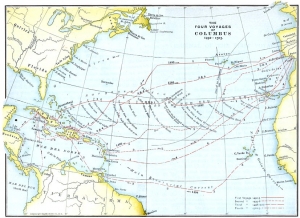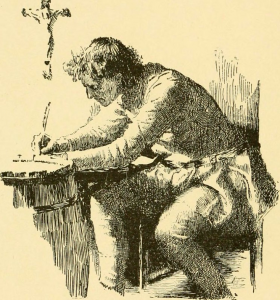One of the tired old myths promoted by the anti-Columbians (as they might well be called) is that the lust for gold drove Columbus leading him to commit innumerable atrocities. Critics shout that all wickedness was done in Columbus’s “vain pursuit of his obsession for gold.”1 This accusation gets thrown in with all the others, painting Columbus as a heinous villain instead of the noble navigator (as he was largely known for centuries). For example, it is common to hear anti-Columbians boast how:
Recent years have brought us Columbus the Bumbling Idiot who bumped into America by accident, Columbus the Gold-Obsessed Slave Driver, and Columbus the Mass Murderer.2
Unlike many of the other accusations, Columbus’s relationship with gold has always been under the spotlight. One of Columbus’ crew members was even led to think that all Columbus cared for was gold. That man remarked on the second voyage:
After we had rested for several days in our settlement it seemed to the Lord Admiral that it was time to put into execution his desire to search for gold, which was the main reason he had started on so great a voyage full of so many dangers as we shall see more completely in the end.3
Often people point to this quote as definitive proof that the primary goal of Columbus was gold and wealth—Columbus only cared about getting rich and he enslaved, raped, pillaged, and destroyed anything that got in his way.
The Truth
 However, this statement from Columbus’ ship mate, and the myths of the anti-Columbus critics, directly contradicts everything Columbus wrote about his motivations.
However, this statement from Columbus’ ship mate, and the myths of the anti-Columbus critics, directly contradicts everything Columbus wrote about his motivations.
Based off the overwhelming primary source documentation Columbus was not an explorer driven by greed—much rather he was a discoverer who sought to restore a shattered world. The discovery of gold was important to him but not at all in the way critics represent it today.
First off, we must note that Columbus immediately instituted a policy of mutual free market exchange when it came to trading with the native tribes for gold. It is recorded that Columbus sought to:
Prevent the others from imposing upon the Indians. As the Indians are so simple, and the Spaniards so avaricious and grasping, it does not suffice that the Indians should give them all they want in exchange for a bead or a bit of glass, but the Spaniards would take everything without any return at all. The Admiral always prohibits this, although, with the exception of gold, the things given by the Indians are of little value. But the Admiral, seeing the simplicity of the Indians, and that they give a piece of gold in exchange for six beads, gave the order that nothing should be received from them unless something had been given in exchange.4
The Motivation
But ultimately, the most important question to ask is, “Why did Columbus search for gold?” What was his ultimate motivation? If it wasn’t for personal wealth, then what was it for? Thankfully, Columbus’ own journal answers this question by explaining that after the first voyage Columbus:
Trusted in God that, when he returned from Spain, according to his intention, he would find a ton of gold collected by barter by those he was to leave behind, and that they would have found the mine, and spices in such quantities that the Sovereigns would, in three years, be able to undertake and fit out an expedition to go and conquer the Holy Sepulcher. “Thus,” he says, “I protest to [ask] your Highnesses that all the profits of this my enterprise may be sent in the conquest of Jerusalem.”5

Note that Columbus writes to the King and Queen explicitly calling upon them to devote all of the profits to liberate Jerusalem from the grip of the Muslim conquerors. It may be shocking to someone who only knew that “in fourteen hundred ninety-two, Columbus sailed the ocean blue,” but Columbus actually considered himself someone called by God to help restore the lands conquered by Islamic Jihad in the previous centuries (see Dr. Warner’s video explaining the historical context). In another letter he writes to Ferdinand and Isabella explaining, “the argument I have for the restitution of the Holy Temple to the Holy Church.”6
In the same letter to the King and Queen, Columbus explains that going back to St. Augustine, many within the Church predicted that the world would end 7,000 years after creation. Based on the work of Augustine, Pierre d’Ailly, and others, Columbus concluded:
there are but 155 years left for the fulfillment of the seven thousand, at which time I said above, by the authorities cited, that the world will come to an end.7
Conclusion
Columbus seriously thought that he would have a pivotal role in preparing the world for receiving the returning Messiah at His triumphant return in Jerusalem. In one of the least discussed but most important documents for understanding Columbus—the Book of Prophecies—Columbus actually collects all the supposed evidence and prophecies for the discovery of the New World and his spiritual and religious motivations for sailing across the ocean. Therein he presents his argument again for using the discovery to push back the Islamic invasion of the Holy Land while they still had time. He writes:
Who doubts that this illumination was from the Holy Spirit? I attest that he [the Spirit], with marvelous rays of light consoled me through the holy sacred Scriptures, a strong and clear testimony, with forty-four books of the Old Testament, and four Gospels with twenty-three Epistles of those blessed Apostles, encouraging me to proceed, and, continually, without ceasing for a moment, they inflame me with a sense of great urgency. Our Lord wished to perform the clearest miracle in this [matter] of the voyage to the Indies, to console me and others in this other [matter] of the Holy Temple.8
Clearly, Columbus’s main motivation in seeking the New World was religiously motivated and not driven by personal greed for riches. Much rather, he advocated that all proceeds be directed by the King and Queen to the interests—at the time—of the Church. In fact, Columbus closes his letter to Ferdinand and Isabella by focusing on the fact that the discovery of the “Indies” meant that Christianity was being spread across the world:
And I say that the sign which convinces me that our Lord is hastening the end of the world is the preaching of the Gospel recently in so many lands.9
So, contrary to the anti-Columbus academics of today, Columbus cared more about God than gold.
Endnotes
1 Edward Stone, “Columbus and Genocide,” American Heritage (October 1975, Volume 26, Issue 6), at: https://www.americanheritage.com/content/columbus-and-genocide
2 Jason Gotts, “Beyond Columbus the Hero, the Slave Driver, or the Bumbling Idiot,” Big Think (October 6, 2011), at: https://bigthink.com/think-tank/beyond-columbus-the-hero-the-slave-driver-or-the-bumbling-idiot
3 Michele de Cuneo, “Michele de Cuneo’s Letter on the Second Voyage, 28 October 1495,” Journals and Other Documents on the Life and Voyages of Christopher Columbus, trans. Samuel Morrison (New York: Heritage Press, 1963), 214.
4 Clements Markham, “December 22, 1492,” Journal of Christopher Columbus (London: Hakluyt Society, 1893), p. 127-128.
5 Clements Markham, “December 26, 1492,” Journal of Christopher Columbus (London: Hakluyt Society, 1893), p. 139.
6 Christopher Columbus, “Letter from the Admiral to the King and Queen,” Christopher Columbus’s Book of Prophecies, trans. Kay Brigham (Fort Lauderdale: CLIE Publishers, 1992), 179.
7 Columbus, “Letter from the Admiral to the King and Queen,” Book of Prophecies, trans. Brigham (1992), 181.
8 Columbus, “Letter from the Admiral to the King and Queen,” Book of Prophecies, trans. Brigham (1992), 179.
9 Columbus, “Letter from the Admiral to the King and Queen,” Book of Prophecies, trans. Brigham (1992), 183.
Still looking for answers? Visit our FAQ page
More Resources
Know the Truth and Protect Your Freedoms.
Still looking for answers? Visit our FAQ page
Stay Informed with the Latest Resources
Enter your email address to receive our regular newsletter, with important information and updates right in your inbox!










